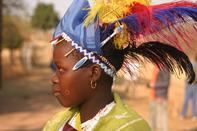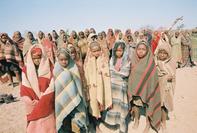Life in a Muti
The birth of a baby is a moment of great joy in Tsonga society. Usually older female relatives, or other wives, help pregnant mothers through the last stages of their pregnancy and the birth of the infant.

Newly born babies are doctored with medicines and decorated with charms and beaded bangles. Normally mothers breastfeed for at least the first two years of their babies' lives. Once children can walk, the burden of bringing them up is shared between the mother and older sisters.

Children are expected to perform domestic duties from an early age. Daughters help their mother in their daily duties, gathering firewood, and fetching water from a nearby river, spring or tap, carrying water containers on their heads.
Older boys herd the family's cattle, while the younger boys herd the goats. In many parts of the old Transvaal, adult status was attained after initiation. Boys and girls were initiated in separate groups and, only after the prescribed rites had been performed, were they allowed to marry.